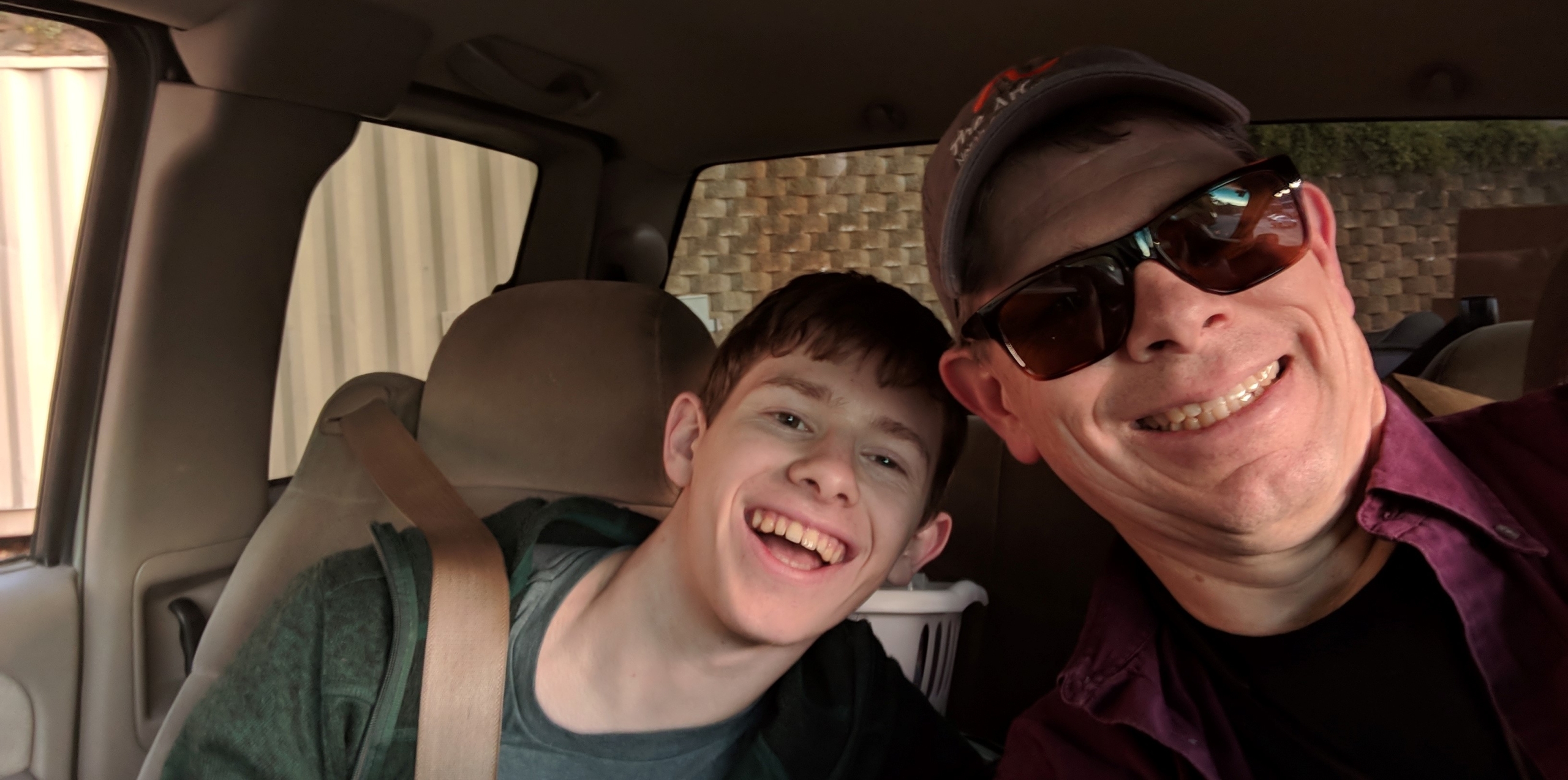 Isaac has autism and mental health disabilities. Isaac sometimes gets very focused on certain things and struggles to adjust or focus on other things. To help him in school, a 504 plan was created so that teachers and other staff at the school would know how to support and redirect him safely.
Isaac has autism and mental health disabilities. Isaac sometimes gets very focused on certain things and struggles to adjust or focus on other things. To help him in school, a 504 plan was created so that teachers and other staff at the school would know how to support and redirect him safely.
When Isaac was 15 years old, that plan failed when he was put in a chokehold at his school by the school resource officer. Now 22, Isaac and his dad, John, shared with us about the incident and how it impacted Isaac’s school life.
Tell us about the choking incident. What happened?
ISAAC: I was in band class. Our school called students to the gym for a sex education class. The teachers told us you didn’t have to go if you didn’t want to, or if you signed a paper saying you weren’t going to go. I told them I didn’t want to go, but they still forced me to go. Since I didn’t want to be in the room, I went to the other side of the gym to nap until the class was over.
One of the teachers didn’t like that I was napping and ignoring the class, and they asked me which teacher I had for the period. I didn’t answer because I felt like the teacher was trying to get me in trouble, even though I had not done anything wrong. When I refused to respond, they called in two administrators. The administrators told me to give them my backpack and search through it. I refused to give it to them, as they did not have the right to take my things for no reason. They then tried to take my backpack from me forcefully. Finally, the school resource officer got involved. He took my bag from me.
I was still trying to get my bag back from them. I was not fighting back but resisting the situation. The officer forced me to the ground. He stood side-by-side with me, placed his left leg in front of both of my legs, and lifted his leg backward. This swept my legs from underneath me and caused me to land on my stomach. Then, since I was still resisting and trying to get back up, he got on top of me and started to choke me. I stopped resisting after about 10 seconds because I did not want to black out. After that, he let me go and began searching my backpack because he claimed that the administrators thought I had drugs or a bomb in my bag. I obviously did not have anything like that in there.
What happened after the incident?
ISAAC: The afternoon after the incident, the school told my mom that they had wanted to search my backpack, and I resisted this. They did not share that I was put in a chokehold. My mom told the school that I had a 504 plan that describes how to support me if I resist what the staff asks me to do; however, the administrators explained that they had so many kids with 504 plans that they could not have possibly known which students do or don’t have plans—or be expected to follow them in the heat of the moment.
Later that week, the school resource officer told me he was sorry for the run-in, but did not acknowledge that he or the school may have been in the wrong. He did at least try to get to know me better and have a civil relationship from that point on.
No one from the school ever told my mom or dad that I was in a chokehold or taken down by the school resource officer.
I didn’t tell them either. I was new to the school. I am also not a tall guy and, at the time, was 106 pounds. I was a new, short, small kid that no one knew. I didn’t want to be a target for bullying. People at my new school were already wary of me before the incident because of how I reacted to things and because I always wore a hood because I was always cold. After the incident, a rumor started that the officer had tackled me.
Afterward, people feared me. People began to worry and ask whether I would shoot up the school. I was okay with people being scared of me because I was just happy that people were not trying to bother me or bully me. And I had friends who knew me. However, I was portrayed as the bad guy by classmates and at school.
John, how did you and your wife discover the incident?
JOHN: I was at the high school several months later to speak to a class at the teacher’s invitation. When I was introduced, it was mentioned that I was Isaac’s father. A student at the side of the room said, “I know that dude. He’s crazy!” After that, I asked Isaac if something happened.
As a parent, I was extremely disturbed. Nobody likes to hear that their child is bullied or being targeted. I had a few experiences with bullying as a child, and no one wants that.
I’m also a professional disability advocate. At the time, I had also just watched the reports around Ethan Saylor, who was tackled and suffocated to death. There were also some reports of teachers being tough and not accommodating to students with disabilities because they don’t understand how to help them.
When my wife and I discovered Isaac was put in a chokehold, it was months later. At the time, there was not much more we could do but try to fix the rules that caused the incident. But that’s not enough—changing the rules does not change people’s attitudes.
When people think of autism, they see Rain Man or The Good Doctor. With Isaac, you would not know he had autism unless you knew him very well. He does not present how people typically think of someone with autism. As a result, he sometimes gets pushed around more than other kids.
The incident should never have happened. For the administrators to talk it down or brush it off without informing us is the most disturbing thing. He was assaulted—and no one bothered to tell us about it.
What do you want other people to know about the use of restraint and seclusion?
JOHN: I want them to know the same thing my father taught me: there’s never a reason to resort to violence. I have never yet seen, even in the worst situations, a need to escalate to violence because people are not responding clearly and immediately to demands. There are ways to get the desired result, but sometimes, you have to dig a little deeper. There are always other options.
What happened could have been averted if they had gotten to know my son. How many people use seclusion and restraint instead of getting to know the kids they support? Educators need a better sense of what is happening and how to help the kids they educate. In our home state of North Carolina, educators only need eight hours of training to work in a classroom for kids with disabilities. How can you expertly support kids with only eight hours of training? Certainly, more could be done to prepare teachers.
ISAAC: I want other kids with disabilities to know the same thing my father taught me: there’s never a reason to resort to violence. And that they should wait until your parents get there to speak with the school. Quite literally, your parents are your lawyer. Teachers won’t always listen to you. It would be best to have your folks with you to argue for you and advocate on your behalf. To parents, you may be angry about an incident, but you still need to be civil and work with the school because otherwise, the school won’t help your child; they may suspend or expel them instead. You must do your best to be civil and willing to work together to keep your student at school.
JOHN: I’m proud of my son for what he just said. Previously, I spent time as a trustee on a school board. People would ask over and over what school is the best for kids with disabilities. The critical difference in outcomes for kids with or without disabilities is parents being involved. They know who we are and that we are not just angry parents but also active and involved in the school. It changes the educators’ attitudes, and they see our child more as a person. They become more willing to engage with parents and intervene before things blow up.
Parents should also know what their and their kids’ rights are and be able to call people out when needed. Isaac is my fifth child. I know our rights and how to advocate with him because I made mistakes and learned with my previous children. Sometimes, administrators will say things that do not respect the rights of kids and parents. They may push boundaries that they should not do so and rely on parents not to know their rights. It can be intimidating. Parents must know their and their kids’ rights and advocate.


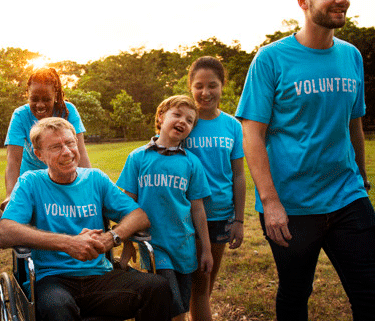

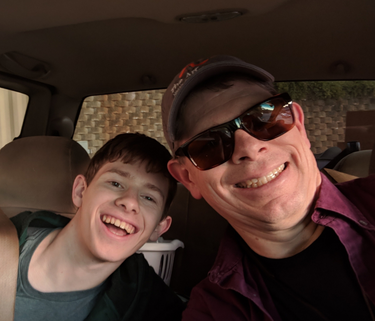
 Isaac has autism and mental health disabilities. Isaac sometimes gets very focused on certain things and struggles to adjust or focus on other things. To help him in school, a 504 plan was created so that teachers and other staff at the school would know how to support and redirect him safely.
Isaac has autism and mental health disabilities. Isaac sometimes gets very focused on certain things and struggles to adjust or focus on other things. To help him in school, a 504 plan was created so that teachers and other staff at the school would know how to support and redirect him safely. 



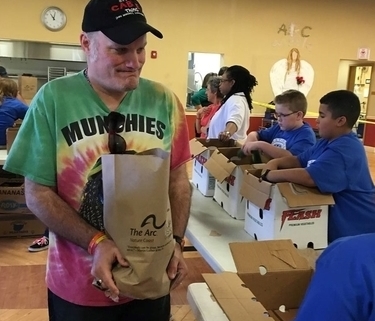
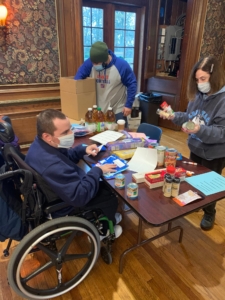
 As the big day arrived, volunteers with disabilities again led the way, including Nijah, who oversaw setup. Others prepared the boxes, packed the meal kits, and completed quality inspection. Once all boxes were packed and ready for distribution, the group delivered 100 meal kits to Island Harvest, Long Island’s food bank. In total, 400 individuals were served that day.
As the big day arrived, volunteers with disabilities again led the way, including Nijah, who oversaw setup. Others prepared the boxes, packed the meal kits, and completed quality inspection. Once all boxes were packed and ready for distribution, the group delivered 100 meal kits to Island Harvest, Long Island’s food bank. In total, 400 individuals were served that day.





